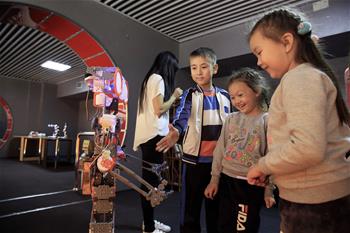BEIJING, Oct. 30 (Xinhua) -- Excitedly showing her smartphone screen to her friends, 82-year-old Ma Xiuqin has just sent out her first picture using WeChat, the Chinese messaging and social media platform.
To help her master the skill, 23-year-old Li Meina spent three weeks working in a community nursing center in Beijing.
Unlike most of her peers, Li Meina works among people who are old enough to be her grandparents. Taking charge of organizing activities in the nursing center for two years, she tries to find fresh and fun activities for the elderly, but it is not always easy.
In China, an increasing number of college graduates like Li are choosing the career. When a group of professionally trained youngsters in their early 20s meet the silver-haired, what they unveiled is a piece of China's vast elderly care industry.
China has taken significant steps to develop elderly care, especially community-based elderly care services. The government has promised to support institutions offering services in communities like daycare, rehabilitation care, assisted meal services and outdoor activities.
Mainly due to the Chinese tradition of showing filial piety to the elders, almost 90 percent of seniors in China rely on family support.
But with the facilities and services getting better, Li Meina believes that the number of the elder willing to choose community elderly care will get bigger and bigger.
To help her aged friends better communicate with the outside world, Li chooses WeChat as a way to help them access new information and share their daily lives. She designs WeChat tutorials and already has a following among the elder community.
Among all her "students," Zhang Wen is the most diligent. The 75-year-old retired teacher always brings a notebook to attend the class, writing neatly in lines to record how she can make video calls and post pictures through WeChat.
"She would write down at least two pages every class, and I also gave her additional lessons," Li said. Having spent so much time together with the elderly, she feels like she has become their adopted child.
Li Su, 21, works as a nurse at the Honghu Nursing Institution in east China's Shandong Province. His workday starts with cleaning for the elderly at 6:30 a.m.
Graduating from Dezhou Vocational and Technical College of Shandong in August this year, majoring in elderly services and management, Li Su stepped into what Honghu's director Xu Baoying called "the most difficult position" -- caring for the elderly with dementia and disabilities.
Regularly cleaning, feeding and massaging, the thing that comforts Li Su the most is the elder residents responding to his voice and touch. Although younger than some of their grandchildren, Li Su sometimes spends more time with the residents than their families.
In the eyes of Li Meina and Li Su, every practitioner of the elderly care industry has a warm heart.
But the reality is not always rosy.
China already has a large number of old people, and the population is aging rapidly. The number of people aged 60 and over was 249.49 million at the end of 2018, accounting for 17.9 percent of the total population, up 0.6 percentage points from the year earlier, according to the National Bureau of Statistics.
Statistics show that there are currently 40 million disabled elderly people in China, and there is a need for 6 million elderly care workers, yet the number today stands at just 300,000.
Two years after graduation, less than one-third of Li Meina's 168 peers have remained in the elderly care field. Of Li Su's five classmates, only he still works in the industry.
High work intensity and low salary are two key reasons why youngsters are leaving the industry. After working as a nurse for two years, Li Meina's roommate in college already has serious lumbar muscle strain due to the constant bending over in his daily work.
However, Li Meina's motivation, which is also her regret -- unable to take care of her own grandmother until her death, has inspired her to devote to the elderly care work.
Currently, the huge social demand for and urgent shortage of trained staff have attracted the attention of the authorities.
In October, seven departments including education, civil affairs and commerce issued a guideline which indicated that local educational administrations should encourage the training in areas in which the social service industry is in short supply.
This could take the form of preferential policies, funds and projects, so as to attract students to study relevant majors, including the elderly care.

















